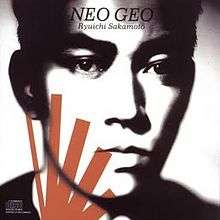Neo Geo (album)
Neo Geo is a 1987 album by Ryuichi Sakamoto. The term "neo geo", or "new world", is derived from Sakamoto himself as a way to describe worldwide musical diversity in regard to genre (similar to world music and world beat).[2]
| Neo Geo | ||||
|---|---|---|---|---|
 | ||||
| Studio album by | ||||
| Released | July 1, 1987 (Japan) | |||
| Genre | Fusion, electronica, synthpop, folk, world | |||
| Length | 34:46 | |||
| Label | Sony Music | |||
| Producer | Bill Laswell, Ryuichi Sakamoto | |||
| Ryuichi Sakamoto chronology | ||||
| ||||
| Review scores | |
|---|---|
| Source | Rating |
| AllMusic | |
The track "Risky" featuring Iggy Pop on vocals was released as a single with another track from Neo Geo "After All" as the B-side. The music video for "Risky" was directed by Meiert Avis and was released in two different versions to accompany the 7" and 12" extended version of the song. The latter contains scenes of female nudity. [3]
Track listing
| No. | Title | Length |
|---|---|---|
| 1. | "Before Long" | 1:20 |
| 2. | "Neo Geo" | 5:08 |
| 3. | "Risky" | 5:26 |
| 4. | "Free Trading" | 5:28 |
| 5. | "Shogunade" | 4:32 |
| 6. | "Parata" | 4:21 |
| 7. | "Okinawa Song – Chin Nuku Juushii" | 5:19 |
| 8. | "After All" | 3:08 |
Personnel
- Performers
- Ryuichi Sakamoto – keyboard, piano, computer
- Yukio Tsuji – shakuhachi, gayageum
- Iggy Pop – vocals (3)
- Kazumi Tamaki – vocals
- Misako Koja – vocals
- Yoriko Ganeko – vocals
- Bill Laswell – bass
- David Van Tieghem – percussions
- Bootsy Collins – bass
- Emmett Chapman – Chapman stick
- Tony Williams – drums
- Sly Dunbar – drums
- Eddie Martinez – guitar
- Haruo Kubota – guitar
- Lucia Hwong – pipa
- Technical
- Jason Corsaro – mixing
- Clive Smith – programmer
- Jeff Bova – programmer
Charts
| Chart (1987) | Peak position |
|---|---|
| Japanese Albums (Oricon)[4] | 8 |
gollark: The "solution" is probably something something compatibilism.
gollark: Since it's so poorly defined, people can basically just argue it any way they want, which is bad.
gollark: And "consciousness".
gollark: It means too many things, like "respect".
gollark: Free will is a bad concept, in my IMO.
References
- Mills, Ted. "Neo Geo". AllMusic. All Media Network. Retrieved December 8, 2015.
- Beale, Lewis (June 21, 1992). "Maestro of the Universe : African Drummers, Japanese Chants, Irish Flutes--the High-tech, High-concept music of Ryuichi Sakamoto Is All Over the Map". Los Angeles Times. Tribune Publishing. p. 1. Retrieved January 23, 2016.
- Kretsch, Ron (January 13, 2014). "Iggy Pop and Ryuichi Sakamoto's 'Risky,' a video tribute to Man Ray". Dangerous Minds. Retrieved December 8, 2015.
- オリコンチャートブック〈LP編(昭和45年‐平成1年). Minato, Tokyo: Oricon Books. 1990. ISBN 4871310256.
This article is issued from Wikipedia. The text is licensed under Creative Commons - Attribution - Sharealike. Additional terms may apply for the media files.